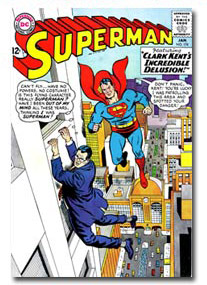 Clark
Kent's Incredible Delusion
Clark
Kent's Incredible Delusion
A lot of guys dream at one time or another about being
the Man of Steel, and in Superman #174 (Jan 1965), Clark
Kent comes to the shocking realization that he's just one
of those many dreamers.
Writer Edmond Hamilton serves up this super psycho-drama
with artist Al Plastino (and a splash page by Curt Swan
and George Klein).
At the Daily Planet, Clark Kent is visited by a man calling
himself Adam Newman, who proposes to hand Clark a huge scoop;
Superman's secret identity. Ready to write the guy off as
a kook, Clark plays along, asking Newman to reveal the secret.
Newman complies by opening his shirt and jacket to reveal
a Superman suit beneath. "I am Superman!" he says.
Clark asks for proof, and Newman provides it, lifting the
reporter's desk with one hand while setting fire to the
paper in his waste basket with heat vision. "I want
you to reveal my identity," he says, "because
several unbalanced men have recently had delusions that
they're Superman...and I want to stop their hallucinations!
Goodbye!"
Newman leaves and Clark tries to follow him with super-vision,
only to find it's not working. He switches to Plan B; flying
after Newman to monitor him from above. That doesn't work
out so well, either.
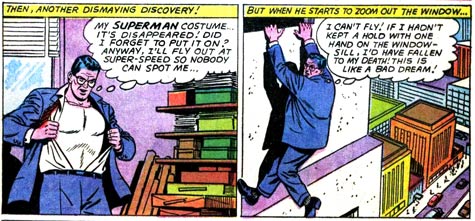
Climbing to safety, Clark ponders the mystery of his missing
powers. He rules out exposure to Red Kryptonite, since he
didn't feel the familiar tingling that accompanies its effects.
Suspecting "Adam Newman" is somehow responsible
for his predicament, he sets out to locate him.
Clark returns to his apartment, planning to use one of
the Superman robots there to take him to the Fortress of
Solitude. When he arrives, however, he gets another nasty
shock; his secret closet is gone. Briefly he considers contacting
Supergirl before remembering she's off-planet.
Then he happens on the notion of consulting Batman:
"If he doesn't reassure me that I'm
Superman, then I'll know I'm nuts!" Again, no joy.
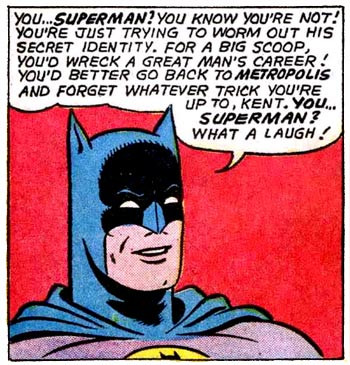
Returning to Metropolis on a passenger plane, Clark and
his fellow passengers face death when the plane encounters
a gust of wind that nearly sends it careening off the runway.
At the last moment, they are saved by what appears to be
Superman. Lana Lang appears to conduct an impromptu interview
of the Man of Steel, and Clark speaks up, calling this "Superman"
a fake. A policeman takes offense at Clark's outburst and
arrests him for "creating a disturbance" (tough
town, that Metropolis). Superman takes pity on him and goes
along to speak to the police chief on Clark's behalf.
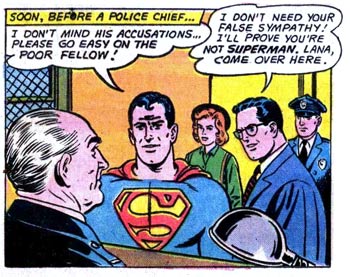
Clark reminds Lana of an incident from their shared childhood
in Smallville, in which Lana fell into a large vat of taffy
(sounds like her, alright). Superman not only remembers
it, he even remembers what he told Lana when he pulled her
out ("You're really the sweetest girl in town now!"),
a detail even Clark forgot, now that his power of total
recall has faded with all his other powers.
The police chief agrees to let Clark go on the condition
he visits a psychiatrist. On the shrink's couch, Clark recounts
some of the great feats performed by Superman in his Smallville
years. "But what about your boyhood, Clark Kent?"
asks the doctor. "Were you a school athletic hero,
or a popular leader? Was your life glamorous?" Of course
the answer is no, since Clark went out of his way to be
"drab" to prevent discovery of his secret identity.
But the doctor has an equally convincing take on affairs:
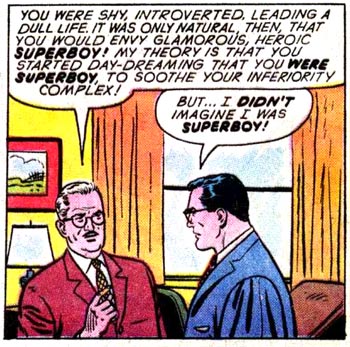
Growing more confused all the time, Clark exits the doctor's
office to find Lois Lane waiting for him, offering support.
As they exit the building, Lois points to the sky, where
Superman is seen flying by in silhouette, accompanied by
his super-pet, Krypto. "Krypto's scent
would never be deceived by an impostor!" thinks Clark,
"therefore, the Superman flying with Superman isn't
an impostor..." Yes, but what if Krypto is a fake,
as well?
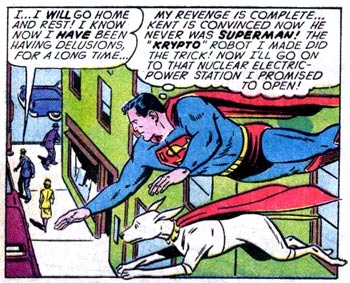
So now we know for sure that "Superman" is a
fake, someone with a grudge against the real Man of Steel.
The fake Superman keeps an appointment at a new power plant,
throwing the switch to turn the plant on, a task deemed
too dangerous for a normal human. Indeed, the generator
malfunctions and delivers a shock that mortally injures
the fake Superman, who returns to Metropolis to find the
real deal. Flying awkwardly to Clark Kent's apartment, the
fake Superman falls in through the window and tells Clark
he'll have his powers back if he only takes off his shoes.
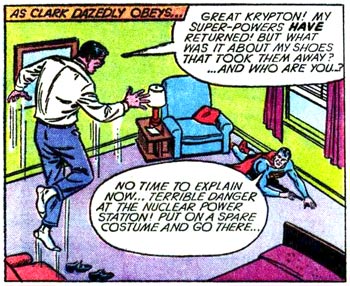
Quickly, Superman shuts down the generator at the plant
and returns to get the full story from his dying doppleganger.
It turns out the fake Superman is an android, a "perfect,
flesh-like double" created by Superman weeks earlier
to help protect his secret identity in situations where
a robot would not pass close inspection. But while he passed
the "look-alike" test, the ersatz Superman proved
mentally slow and too awkward and uncoordinated to perform
reliably, and besides that, vulnerable to electrical shock
(as events have just proven). The fact that he possessed
super-powers only elevated that awkwardness to the level
of dangerousness, so Superman rejected the android as a
failed experiment.
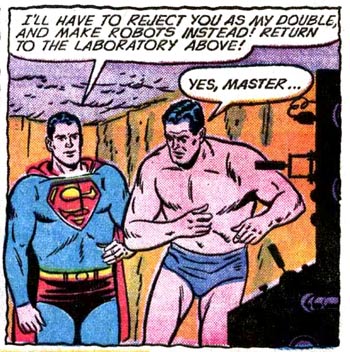
What Superman planned to do with the android after that
is anyone's guess, since the duplicate stumbled into an
electrical generator, resulting in his apparent destruction.
In reality, he was only hurled behind a large, lead slab,
hidden from Superman's view. When Superman left, the android
rose to find the shock had actually fixed him, embueing
his mind with ruthless cunning and giving him the mental
power needed to correct his earlier awkwardness.
Left alone in the Fortress, the android studied records
of Superman's life so as to learn all his secrets, then
designed a device to take away his powers.
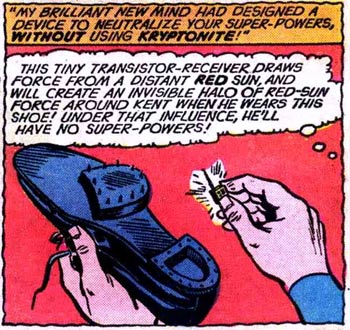
Then it was a simple matter to get rid of the robots in
Clark's apartment and seal up the secret closet. A note
left in the Batcave directed Batman to deny to everyone
that Superman is Clark Kent, even if the person asking IS
Clark Kent. That "rescue" of Clark's plane was
staged by the android, who used his super-breath to cause
the near-crash in the first place.
"I meant to keep you convinced your entire Superman
past was only a delusion," says the dying android,
"But with the city in danger I had to have your help!
I know now how foolish my revenge-obsession was!" Superman
notes that when it counted, the android came through, abandoning
his revenge to save others. As a reward, he works at super-speed
to create a memorial for "Android-I," so that
"Metropolis never forgets what you did!"
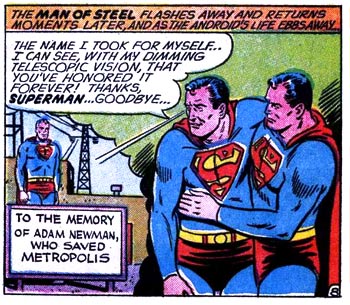
This one crams in almost every cliche in Uncle Morty's
playbook; the Superman impostor, the "bad" robot
with a heart of gold, the last-minute redemption of a once-heartless
foe. There are also in this tale of Android-I strong echoes
of Wonder-Man, the former Superman
robot who first challenged, then aided Superman and was
rewarded with a statue, and of the Tyrant
Superman, the Kandorian replacement who erected several
statues in his own honor before becoming a statue himself.
And those are just two examples; sometimes it seems like
every street corner in Metropolis must feature a statue
honoring a fallen Superman wannabe.
There's a lot of potential in this concept, and one can
only wonder how well it might have played out with room
to breathe; it doesn't even fill this whole issue, let alone
the two or three it might have merited in the Bronze Age.
In the hands of a Maggin or Bates, this might have been
a biggie. As it is, the scene that packs the most punch
is Clark's conference with the psychologist, and not any
scenes of super-heroics. When the shrink tells Clark he's
made up his whole life as Superman to compensate for being
a drab milksop, we almost...almost tip over into Twilight
Zone suspense and unease. But it's fleeting, and nothing
can be that emotionally harrowing when Al Plastino's drawing
it.
Of course where the whole thing falls apart is in the shoes.
Surely Android-I doesn't expect to fool Superman forever,
as sooner or later he's bound to do something super with
his shoes off, even if it's something as simple as accidentally
kicking a chair across the room in his sock feet, when anyone
else would painfully stub their toe. If Hamilton had put
a little more thought into the mechanism for Clark's powerless,
this might have worked better.
Still, for me it's all worth it for that indescribably
fantastic Curt
Swan cover, easily one of the top ten in his
long Superman career.










